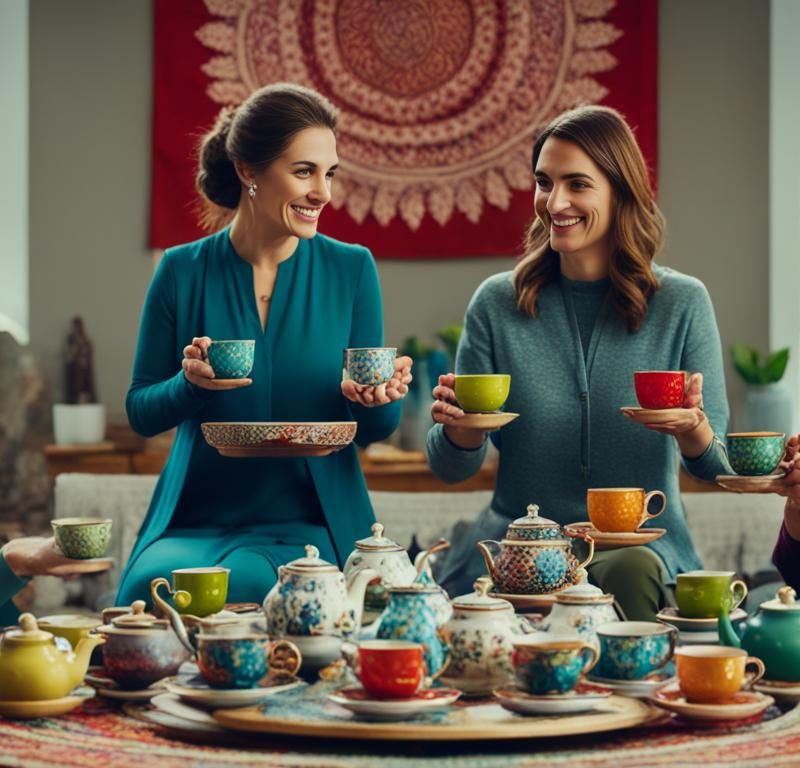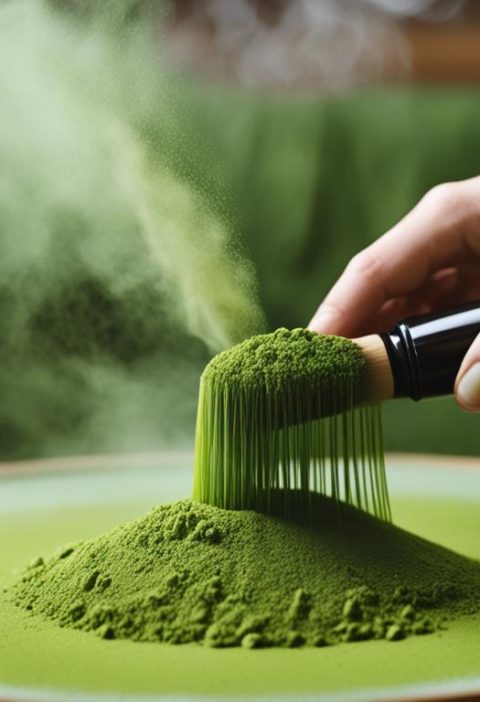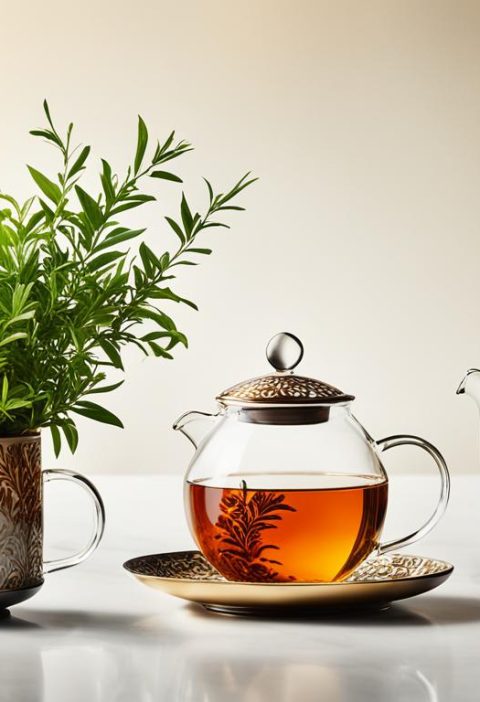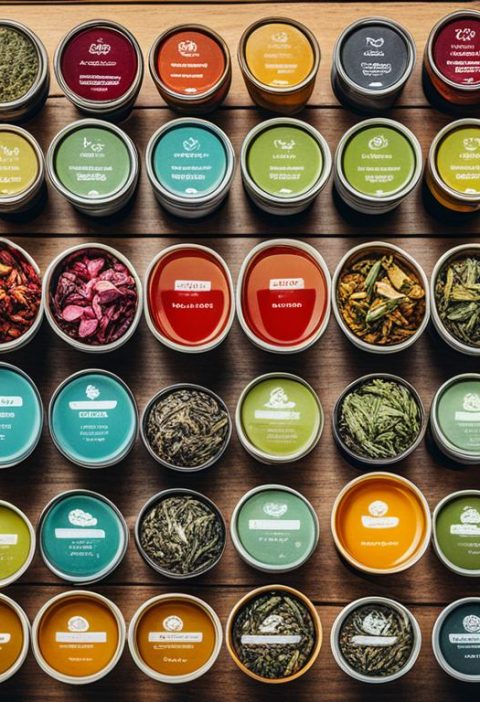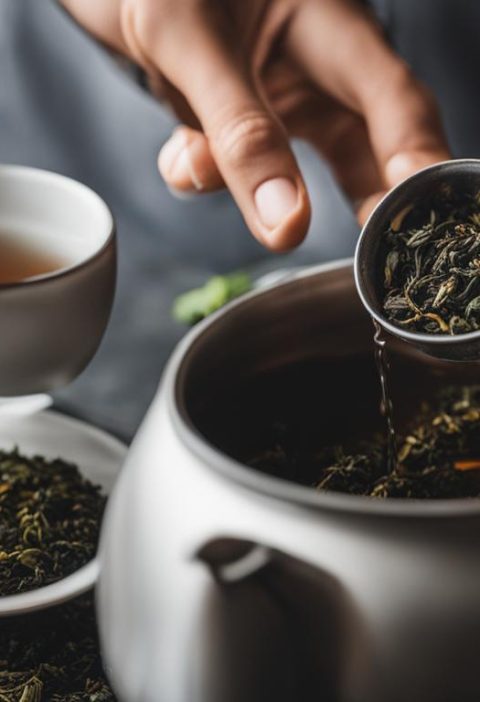Tea has been cherished for its soothing flavors, comforting aromas, and health benefits. In this article, we will explore the world of traditional tea rituals that have been enjoyed for centuries. From the elegant Japanese tea ceremony to the mindful art of Chinese gongfu tea, these rituals elevate tea drinking to a meditative practice, allowing enthusiasts to fully immerse themselves in the beauty and tranquility of tea.
Key Takeaways
- Traditional tea rituals offer a unique and immersive tea-drinking experience.
- The Japanese tea ceremony emphasizes harmony and tranquility, while the Chinese gongfu tea involves multiple infusions for a deeper exploration of flavors.
- Innovative brewing techniques like cold brewing and specialized tea infusers provide fresh and convenient ways to enjoy tea.
- Tea mixology and mocktails allow for creative flavor combinations and personalized drinks.
- Tea can be paired with various foods to enhance the culinary experience.
Traditional Tea Drinking Methods
Traditional tea drinking methods are deeply rooted in cultural traditions that span centuries. These methods, such as the Japanese tea ceremony and Chinese gongfu tea, elevate tea consumption to a mindful and meditative practice. By following precise rituals and utilizing specific utensils, tea enthusiasts can fully immerse themselves in the mindful practice of tea drinking.
Japanese Tea Ceremony: Chanoyu
The Japanese tea ceremony, known as Chanoyu, is a meticulously choreographed ritual that emphasizes harmony, tranquility, and respect. Central to Chanoyu is the ceremonial preparation and consumption of matcha, a powdered green tea. The ceremony follows specific steps, showcasing the exquisite craftsmanship of utensils and the meditative nature of tea preparation. In the serene atmosphere, participants focus on every aspect of the ceremony, from the selection of utensils to the whisking and serving of matcha.
Chinese Gongfu Tea
Gongfu tea is a traditional Chinese tea-drinking practice that involves multiple infusions of tea leaves in small teapots. Gongfu, meaning “skillful brewing,” reflects a deep appreciation for the art of tea preparation. This practice allows tea enthusiasts to explore the nuances of flavor and aroma with each infusion. Gongfu tea ceremonies are a mindful journey, combining precise techniques, tea appreciation, and the enjoyment of an exquisite variety of teas.
| Japanese Tea Ceremony (Chanoyu) | Chinese Gongfu Tea |
|---|---|
| Emphasizes harmony, tranquility, and respect | Focuses on skillful brewing and tea appreciation |
| Utilizes the ceremonial preparation and consumption of matcha | Involves multiple infusions of tea leaves in small teapots |
| Follows precise steps and utilizes specific utensils | Requires specialized teapots and teaware |
| Creates a meditative and mindful tea-drinking experience | Explores the nuances of flavor and aroma |
The Japanese tea ceremony and Chinese gongfu tea are both unique expressions of the rich cultural traditions surrounding tea. Whether it’s the artful and precise nature of Chanoyu or the skillful brewing and appreciation of Gongfu tea, these practices provide a profound and mindful experience for tea enthusiasts around the world.
Now, let’s explore some innovative brewing techniques that have emerged in the world of tea.
Innovative Tea Brewing Techniques
As tea continues to captivate enthusiasts, we are witnessing the emergence of innovative brewing techniques that add a new dimension to the tea-drinking experience. These techniques not only enhance convenience but also unlock a world of refreshing flavors and smooth infusions.
Cold Brewing: A Refreshing Twist
One such technique gaining popularity is cold brewing, which involves steeping tea leaves in cold water for an extended period. This method produces a refreshing and smooth infusion, making it perfect for hot summer days or for those seeking a unique way to enjoy their favorite teas. Cold brewing brings out the delicate flavors and nuances of tea, providing a revitalizing experience.
Convenient Brewing with Loose Leaf Tea
Loose leaf tea offers a superior taste and aroma compared to its bagged counterparts. Brewing loose leaf tea creates a more authentic and customized experience, allowing tea enthusiasts to explore a wide variety of flavors. To simplify the process, specialized tea infusers and strainers have been developed. These accessories make it easier to brew loose leaf tea on-the-go, ensuring a convenient brewing experience without sacrificing the quality of the infusion.
Unleashing the Flavors
The vast world of tea is known for its diverse range of flavors, each offering a unique sensory journey. Whether it’s floral and delicate, bold and robust, or fragrant and aromatic, innovative brewing techniques unlock the full potential of these flavors. By experimenting with different brewing methods, tea enthusiasts can customize their infusion to suit their taste preferences, creating an unparalleled tea-drinking experience.
Through convenient brewing techniques like cold brewing and the use of tea infusers, tea lovers can enjoy a refreshing and seamless brewing experience. These innovative methods bring out the true essence of tea, resulting in a flavorful and satisfying cup every time.
| Benefits of Innovative Brewing Techniques | |
|---|---|
| Enhanced convenience for tea enthusiasts on-the-go | |
| Refreshing and smooth infusion | |
| Unleashing the diverse flavors and aromas of tea | |
| Making loose leaf tea brewing more accessible |
Tea Mixology and Mocktails
Tea is more than just a hot or cold beverage. It holds endless possibilities in the world of mixology and mocktails. By combining different types of tea with herbs, fruits, and other ingredients, we can create a variety of flavorful concoctions that are both refreshing and unique.
Tea mixology allows for a harmonious blend of flavors, bringing out the best in each ingredient. Whether you prefer a light and floral infusion or a robust and spiced concoction, the art of tea mixology enables us to experiment and create personalized drinks that cater to our individual taste preferences.
For example, imagine infusing a citrusy black tea with fresh mint and lime, creating a vibrant and zesty tea-infused mojito. Alternatively, you could mix a delicate white tea with strawberries and basil, resulting in a refreshing and aromatic mocktail.
The possibilities are endless, limited only by our imagination and creativity. Tea mixology offers a platform for us to explore new flavor combinations and push the boundaries of traditional mixology. It challenges us to think outside the box and develop signature tea-infused cocktails that reflect our unique preferences.
Not only do tea-infused cocktails delight the palate, but they also provide a healthier alternative to traditional alcoholic beverages. With the antioxidant properties and various health benefits of tea, we can indulge in flavorful drinks while making mindful choices for our well-being.
So, why not embark on a tea mixology adventure? Let your creativity soar and experiment with different tea types, fruits, herbs, and spices. Craft personalized drinks that impress and tantalize your guests or simply treat yourself to a delicious and unique tea-infused mocktail.
| Tea Mixology Ideas | Ingredients |
|---|---|
| 1. Lemon Mint Iced Tea Mocktail | Black tea, fresh lemon juice, mint leaves, honey, sparkling water |
| 2. Strawberry Basil White Tea Cocktail | White tea, fresh strawberries, basil leaves, simple syrup, club soda |
| 3. Ginger Peach Green Tea Spritzer | Green tea, fresh peaches, ginger syrup, sparkling water, lemon slices |
| 4. Lavender Earl Grey Martini | Earl Grey tea, lavender syrup, vodka, dry vermouth, lemon twist |
| 5. Hibiscus Paloma | Hibiscus tea, grapefruit juice, lime juice, agave nectar, soda water |
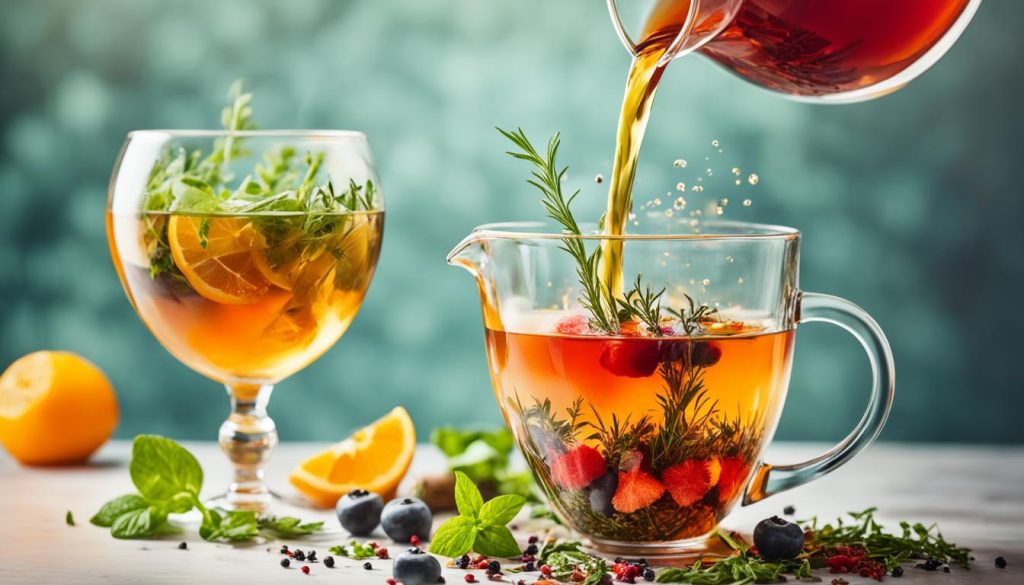
Tea Pairings and Food Combinations
Tea is not just a beverage; it is also a versatile culinary companion that can elevate the dining experience. Similar to the way wine enthusiasts appreciate the art of food and wine pairing, tea aficionados can explore the world of flavor combinations by pairing different teas with various foods. Whether you’re enjoying a delicate white tea, a robust black tea, or a floral oolong tea, there are endless possibilities to discover.
White Tea and Light Flavors
Delicate and subtle, white tea pairs beautifully with light dishes that allow its nuanced flavors to shine through. Seafood, such as grilled shrimp or poached fish, brings out the refreshing qualities of white tea. The crispness of fresh salads, especially those with citrus or fruity elements, harmonizes with the gentle notes of white tea.
Black Tea and Rich Desserts
For those with a sweet tooth, black tea is a perfect choice to pair with indulgent desserts. The robustness of black tea can stand up to bold flavors like rich chocolate desserts, highlighting both the sweetness of the tea and the depth of the dessert. The tannins in black tea help cleanse the palate and prevent the sweetness from becoming overwhelming.
Oolong Tea and Aromatic Cheeses
With its floral and fruity notes, oolong tea complements the flavors of aromatic cheeses. Light and creamy cheeses like Brie or Camembert accentuate the floral nuances of oolong tea, creating a delightful interplay of flavors. The slightly oxidized nature of oolong tea adds complexity to the pairing, enhancing the overall culinary experience.
By experimenting with different teas and foods, tea enthusiasts can unlock a world of flavor combinations and create unique culinary experiences. The key is to explore and discover the harmonies and contrasts between different tea varieties and dishes, allowing each component to enhance the flavors of the other.
Discover the art of tea and food pairing to elevate your culinary adventures. The versatile nature of tea makes it an ideal companion for a wide range of flavors and dishes, providing a unique and enriching culinary experience. Whether you’re a tea connoisseur or a food lover, the exploration of tea pairings will undoubtedly open up a world of gastronomic delight.
Resolutions & Tradition
The beginning of a new year is a time for reflection and setting goals. It is when we make New Year’s resolutions, envisioning a better version of ourselves and a brighter future. According to a global survey, some of the most common resolutions revolve around health and fitness goals, financial stability, and personal development.
As tea enthusiasts, we understand the importance of adopting holistic approaches to well-being. We recognize that tea offers multifaceted benefits beyond being a soothing beverage. That’s why we are incorporating tea into our resolutions, embracing its power to support us in our pursuit of positive change.
Tea can be a companion on our journey towards achieving New Year’s resolutions.
With a global perspective, we can appreciate the cultural diversity that surrounds tea and its connection to tradition. By understanding tea rituals from various countries, we gain insight into the wisdom and practices that have been passed down through generations. This broader perspective allows us to deepen our appreciation for the profound impact that tea can have on our lives.
Let’s explore how tea can be an ally in realizing our New Year’s resolutions:
1. Enhancing Health and Fitness Goals
When it comes to health and fitness, tea has much to offer. Its natural antioxidants and phytonutrients promote overall well-being and support a healthy lifestyle. Incorporating tea into our daily routines can be a simple yet effective way to enhance our physical and mental health.
2. Cultivating Financial Stability
Financial stability is another common resolution. As we strive to make sound financial decisions, tea can play a role in promoting mindfulness and thriftiness. By brewing our own tea at home instead of purchasing expensive specialty beverages, we can save money without compromising on taste or quality.
3. Personal Development with Tea
Personal development encompasses a wide range of aspirations, from learning new skills to fostering inner growth. Tea can be an invaluable tool in this journey, providing moments of relaxation and reflection. By incorporating tea into our self-care routines, we create opportunities for personal growth and a deeper connection with ourselves.
Embracing tea traditions from around the world not only broadens our understanding but also allows us to celebrate the rich cultural heritage associated with this ancient beverage. As we pursue our resolutions, let’s invite tea into our lives, drawing inspiration from the rituals, customs, and flavors that have stood the test of time.
With tea as our ally, we can embark on a fulfilling journey of self-discovery and transformation, aligning ourselves with tradition while embracing the ever-evolving nature of our resolutions.
Tea Trends in Resolution-Making
Tea has emerged as a popular choice for those looking to make mindful and intentional resolutions. With its diverse range of flavors and numerous health benefits, specialty teas have become a go-to companion for individuals striving for betterment in various aspects of their lives. Whether it’s improving overall well-being, promoting mental clarity, or embarking on a fitness journey, tea consumption aligns seamlessly with these resolutions, offering a versatile and healthful companion.
As people become more conscious of their choices, the consumption of specialty teas continues to rise. The market now offers an expansive selection of teas that cater to specific needs and preferences. From revitalizing herbal blends to rich and robust black teas, there is a tea for every palate and resolution. The surge of interest in specialty teas reflects a growing awareness of the profound impact that mindful choices, such as tea consumption, can have on our overall health and well-being.
The Health Benefits of Specialty Teas
Specialty teas offer an array of health benefits that can bolster our resolutions and positively impact our lives. Whether it’s boosting immunity, aiding digestion, or providing stress relief, teas are packed with potent antioxidants and natural compounds that support various aspects of holistic well-being.
| Specialty Tea | Health Benefit |
|---|---|
| Green Tea | Boosts metabolism and aids in weight management |
| Herbal Tea (such as chamomile or peppermint) | Promotes relaxation and a restful sleep |
| White Tea | Supports skin health and offers anti-aging properties |
| Oolong Tea | Enhances mental alertness and focus |
These specialty teas, combined with a mindful approach to resolution-making, can help us achieve our goals and make lasting positive changes. The ceremony of brewing and savoring tea creates moments of calm and reflection, allowing us to recommit to our resolutions each day. Tea becomes not only a flavorful beverage but a tangible reminder of our commitment to self-improvement.
Embracing specialty teas as a versatile companion in our resolution-making journey brings a sense of purpose and mindfulness to our daily lives. By harnessing the health benefits and flavors of tea, we set ourselves up for success while indulging in a delightful and soothing beverage.
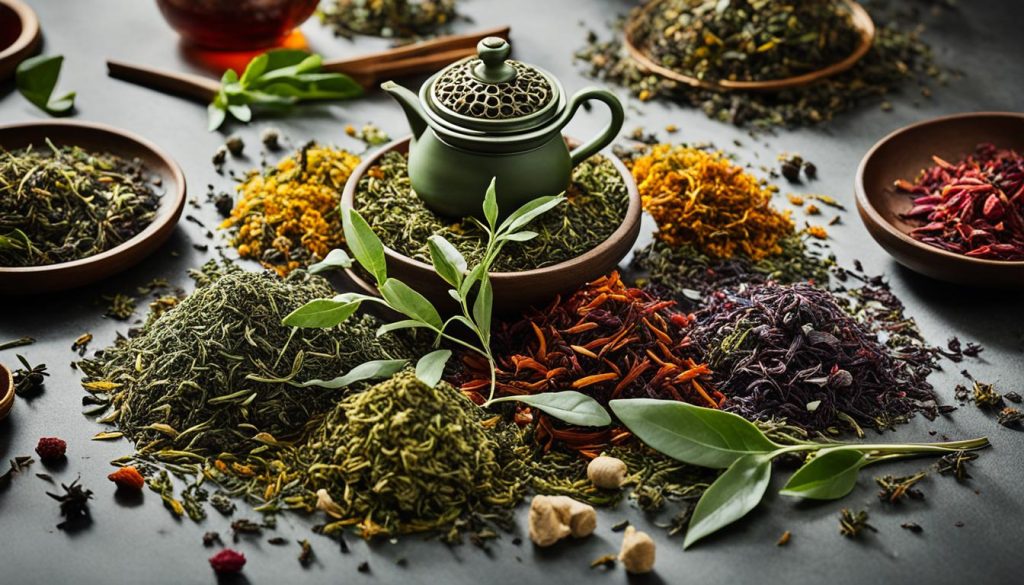
The Wellness Impact of Tea
Tea is not just a beverage; it is also a wellness elixir. Research highlights the myriad health benefits associated with tea consumption, including antioxidant properties and stress reduction. Tea can contribute to holistic well-being, providing a simple yet effective means to achieve one’s wellness goals.
Tea’s antioxidant properties have been widely studied and recognized. Antioxidants help neutralize harmful free radicals in the body, protecting against oxidative stress and the potential damage it can cause to cells. By incorporating tea into our daily routine, we can harness the power of these natural antioxidants and support our overall health.
Moreover, tea has been found to have stress-reducing effects. The act of brewing and savoring a cup of tea can be a calming ritual that helps alleviate anxiety and promote relaxation. The biochemical components of tea, such as L-theanine, have been shown to have anxiety-reducing effects, contributing to a sense of well-being.
Tea can play a significant role in holistic well-being by nurturing the mind, body, and spirit. It provides a moment of tranquility and mindfulness in our fast-paced lives, allowing us to pause, reflect, and find inner balance. The soothing warmth and flavors of tea can be a source of comfort and rejuvenation, enhancing our overall well-being.
The Benefits of Tea for Holistic Well-being:
- Promotes relaxation and stress reduction
- Provides antioxidants to combat free radicals
- Nourishes the mind, body, and spirit
- Enhances overall well-being
Explore the Wellness Potential of Tea
Don’t miss out on the opportunity to incorporate tea into your wellness routine. Whether you seek physical, mental, or emotional well-being, tea can be a versatile companion on your journey to holistic health. Embrace the wellness elixir that tea offers and experience the positive impact it can have on your overall well-being.
Discover the perfect tea to complement your wellness goals and savor the moments of tranquility it brings. Allow tea to be your ally in achieving a balanced and fulfilling life.
Tea and Mindfulness
Mindfulness plays a crucial role in achieving our resolutions, and tea ceremonies provide a unique approach to cultivating this practice. By participating in a tea ceremony, we can find a moment of tranquility, allowing us to reflect and embrace a mindful approach to our goals. Research has demonstrated the positive impact of mindfulness on goal achievement, making tea a valuable tool in our pursuit of resolutions.
During a tea ceremony, we are invited to slow down, savor each sip, and appreciate the present moment. The serene atmosphere, gentle rituals, and focused attention on the tea enable us to let go of distractions and engage in calm reflection. Tea ceremonies offer a respite from our busy lives, allowing us to connect with ourselves and explore the depths of our thoughts.
Incorporating mindfulness into our resolutions can enhance our ability to stay focused, maintain motivation, and overcome obstacles along the way. By dedicating time to tea ceremonies, we create a dedicated space for self-care, introspection, and the exploration of our aspirations. Tea becomes a companion on our journey, reminding us to be mindful, embrace stillness, and find peace amidst the chaos of daily life.
The Benefits of Tea Ceremonies for Mindfulness:
- Provides a moment of calm and tranquility
- Encourages deep reflection and self-awareness
- Fosters a mindful approach to resolutions
- Promotes relaxation and stress reduction
- Enhances focus and concentration
By incorporating tea ceremonies into our daily routines, we can infuse our resolutions with the power of mindfulness, enabling us to approach our goals with clarity and intention. The mindful practice of tea ceremonies not only nurtures our well-being but also strengthens our resolve to achieve the positive changes we seek.
Brewing Success – Tea-infused Resolutions
Tea can be a catalyst for success in resolutions. Whether it’s aiding in weight management, promoting mental well-being, or encouraging financial mindfulness, tea can support various resolutions. The ritual of brewing and savoring tea serves as a daily reminder of our commitment to positive change, creating a tangible link between intention and action.
Tea for Weight Management
When it comes to weight management, certain teas can provide valuable support. Green tea, for example, has been shown to boost metabolism and increase fat oxidation, making it a popular choice for those looking to shed pounds. Its catechins and caffeine content contribute to appetite suppression and thermogenesis, helping to maintain a healthy weight. Matcha, a powdered form of green tea known for its concentrated antioxidants, is another excellent option.
Moreover, herbal teas like peppermint and ginger can aid in digestion and curb cravings, promoting healthy eating habits. These teas can be enjoyed throughout the day as part of a holistic weight management routine.
Tea for Mental Well-being
Mental well-being is essential for overall health and happiness. Tea, with its calming properties and soothing aromas, can play a significant role in promoting mental well-being. Chamomile tea, known for its relaxation-inducing effects, can help reduce stress and anxiety, allowing for better sleep and improved mood.
Additionally, teas like lavender and lemon balm have been traditionally used to support relaxation and ease mental tension. Incorporating these teas into a daily self-care routine can provide moments of tranquility and rejuvenation.
Tea for Financial Mindfulness
Financial mindfulness involves adopting conscious money habits and making intentional choices. Tea can be both a frugal and enjoyable part of this journey. By brewing your favorite tea at home, you can avoid frequent expensive café visits. This practice not only saves money but also enables you to personalize your tea experience, exploring various flavors and blends.
Consider creating a tea budget or allocating a certain amount each month for tea purchases. This approach encourages mindfulness in spending and helps cultivate a sense of satisfaction from mindful consumption.
| Tea | Health Benefit |
|---|---|
| Green tea | Boosts metabolism and aids in weight loss |
| Chamomile tea | Relaxes the mind and promotes better sleep |
| Peppermint tea | Aids in digestion and curbs cravings |
| Ginger tea | Supports digestion and boosts metabolism |
| Lavender tea | Promotes relaxation and reduces stress |
| Lemon balm tea | Calms the mind and uplifts mood |
Commitment to Change
Tea serves as a reminder of our commitment to positive change. Taking the time to brew a cup of tea allows us to pause, reflect, and reinforce our dedication to our resolutions. It encourages mindfulness and intentionality in our daily lives, reminding us that small acts contribute to significant transformations.
Tea Traditions Around the World
Tea traditions are an integral part of the social fabric of many countries. From China’s Gongfu Cha to Japan’s Chanoyu, India’s Chai Culture to the United Kingdom’s Afternoon Tea, and Morocco’s Mint Tea, diverse and fascinating tea customs have shaped communities and enriched the tea-drinking experience worldwide.
Each culture embraces its own unique customs, rituals, and accompanying tea preparations, reflecting the values, history, and social connections of the respective communities. China’s Gongfu Cha emphasizes precise brewing techniques and the artful appreciation of tea’s flavors and aromas. Japan’s Chanoyu, on the other hand, is a solemn and meditative tea ceremony that promotes harmony and tranquility. India’s Chai Culture revolves around the aromatic spices and milk-infused black tea, creating a warm and invigorating blend.
The United Kingdom’s Afternoon Tea is an elegant affair, with dainty sandwiches, scones, and a variety of teas served in fine china. Morocco’s Mint Tea, also known as “Maghrebi” tea, is a symbol of hospitality and is poured with an artistic flourish from a silver teapot. Exploring these tea traditions allows us to immerse ourselves in the cultural customs of different countries and gain a deeper appreciation for the beauty and diversity of tea around the world.
